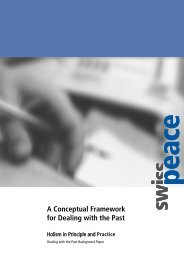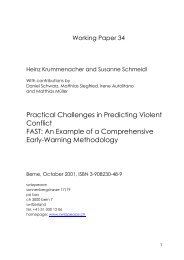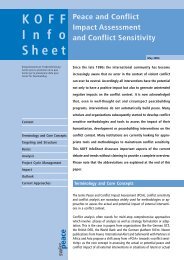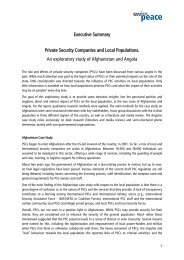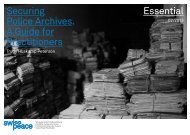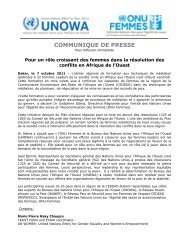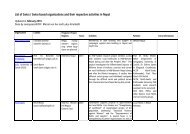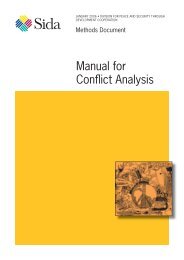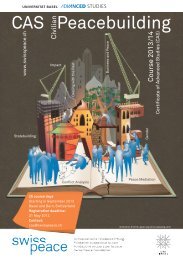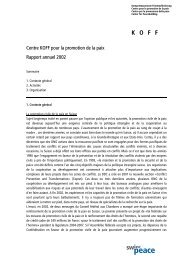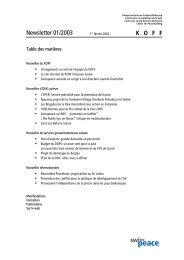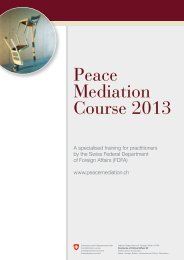Unpacking the Mystery of Mediation in African Peace ... - Swisspeace
Unpacking the Mystery of Mediation in African Peace ... - Swisspeace
Unpacking the Mystery of Mediation in African Peace ... - Swisspeace
You also want an ePaper? Increase the reach of your titles
YUMPU automatically turns print PDFs into web optimized ePapers that Google loves.
<strong>Unpack<strong>in</strong>g</strong> <strong>the</strong> <strong>Mystery</strong> <strong>of</strong> <strong>Mediation</strong> <strong>in</strong> <strong>African</strong> <strong>Peace</strong> Processes<br />
Sudan, North-South Comprehensive <strong>Peace</strong><br />
Agreement<br />
By Simon J A Mason, <strong>Mediation</strong> Support Project, Center for Security Studies, ETH Zurich<br />
In a Nutshell<br />
The Comprehensive <strong>Peace</strong> Agreement (CPA) between<br />
<strong>the</strong> Government <strong>of</strong> Sudan (GoS) and <strong>the</strong><br />
Sudan People’s Liberation Movement/Army<br />
(SPLM/A) based <strong>in</strong> South Sudan ended a war<br />
that cost <strong>the</strong> lives <strong>of</strong> some 2 million people and<br />
lasted between 1983 and 2005. Among <strong>the</strong> ma<strong>in</strong><br />
causes <strong>of</strong> <strong>the</strong> conflict were unequal socioeconomic<br />
development, distribution <strong>of</strong> political<br />
power, and control over natural resources between<br />
<strong>the</strong> center and <strong>the</strong> periphery. In 1994, <strong>the</strong><br />
regional organization Intergovernmental Authority<br />
on Development (IGAD) <strong>in</strong>itiated talks between<br />
<strong>the</strong> GoS and <strong>the</strong> SPLM/A. Talks only<br />
moved ahead seriously <strong>in</strong> 2002, however. The<br />
Machakos Protocol <strong>in</strong> 2002 set <strong>the</strong> framework for<br />
<strong>the</strong> negotiations. The parties agreed on <strong>the</strong> pr<strong>in</strong>ciples<br />
<strong>of</strong> self-determ<strong>in</strong>ation for <strong>the</strong> South, sharia<br />
law for <strong>the</strong> North, and <strong>the</strong> common aim <strong>of</strong> build<strong>in</strong>g<br />
a united Sudan. This framework agreement<br />
was essential to guide <strong>the</strong> subsequent talks, but<br />
negotiations still took nearly ano<strong>the</strong>r three years.<br />
The CPA signed on 9 January 2005 consisted <strong>of</strong><br />
various protocols. The CPA is generally considered<br />
to be <strong>in</strong>clusive <strong>in</strong> terms <strong>of</strong> topics and to be<br />
balanced between <strong>the</strong> GoS (i.e. National Congress<br />
Party NCP) and SPLM, as well as be<strong>in</strong>g<br />
specific on implementation modalities. The key<br />
rema<strong>in</strong><strong>in</strong>g challenges are <strong>the</strong> implementation <strong>of</strong><br />
<strong>the</strong> CPA and <strong>the</strong> o<strong>the</strong>r conflicts <strong>in</strong> Sudan (e.g.<br />
Darfur). The IGAD had a mandate that was limited<br />
to only negotiate <strong>the</strong> North-South conflict.<br />
Even if it tried to get <strong>the</strong> Darfur <strong>in</strong>cluded with<strong>in</strong><br />
its mandate from December 2003 onwards, <strong>the</strong><br />
NCP refused this. Thus <strong>the</strong> Darfur conflict was<br />
not explicitly addressed.<br />
Key Messages<br />
Key role <strong>of</strong> a Regional Organization as mediator:<br />
The Regional Organization IGAD had <strong>the</strong> necessary<br />
leverage to <strong>in</strong>itiate peace talks, due to its uni-<br />
72<br />
fied stance towards Sudan and its <strong>in</strong>terest <strong>in</strong> regional<br />
stability. Later, <strong>in</strong>ternal differences weakened<br />
its <strong>in</strong>fluence on <strong>the</strong> peace process, and pressure<br />
and support came more from <strong>the</strong> US, Brita<strong>in</strong>,<br />
Norway, and <strong>the</strong> EU. Chief mediator Lt.<br />
General Lazaro Sumbeiywo, appo<strong>in</strong>ted by IGAD,<br />
rema<strong>in</strong>ed <strong>in</strong> <strong>the</strong> lead and managed to protect <strong>the</strong><br />
process from too much external pressure.<br />
Pressure and dialog have to be balanced: Too much<br />
pressure can break a process, while <strong>in</strong>sufficient<br />
pressure can prevent talks from mov<strong>in</strong>g ahead.<br />
While dialog and pressure are complementary, it<br />
is <strong>of</strong>ten useful to split <strong>the</strong> roles <strong>of</strong> <strong>the</strong> parties exert<strong>in</strong>g<br />
pressure and those facilitat<strong>in</strong>g, respectively.<br />
Incremental Confidence-Build<strong>in</strong>g: The Nuba<br />
Mounta<strong>in</strong>s ceasefire agreement, mediated by a<br />
US-Swiss team <strong>in</strong> 2002, was a test and key step <strong>of</strong><br />
confidence-build<strong>in</strong>g between North and South<br />
Sudan. It helped to show that steps towards peace<br />
were possible, and was thus able to <strong>in</strong>vigorate <strong>the</strong><br />
IGAD-led process.<br />
Political role <strong>of</strong> <strong>the</strong> chief mediator, operational role<br />
<strong>of</strong> <strong>the</strong> tra<strong>in</strong>ed mediators: The chief mediator (<strong>in</strong><br />
this case Lazaro Sumbeiywo) is <strong>the</strong> moral guarantor<br />
<strong>of</strong> <strong>the</strong> process. Typically, this is a person with<br />
a political background and a high reputation, e.g.,<br />
an elder state <strong>of</strong>ficial. Their role is to l<strong>in</strong>k up with<br />
<strong>the</strong> regional and global stakeholders, lett<strong>in</strong>g useful<br />
people participate <strong>in</strong> <strong>the</strong> process, and keep<strong>in</strong>g <strong>the</strong><br />
o<strong>the</strong>rs out. The more operational nuts and bolts<br />
<strong>of</strong> mediation, moderat<strong>in</strong>g <strong>the</strong> talks and draft<strong>in</strong>g<br />
<strong>the</strong> agreement, are <strong>the</strong>n carried out by tra<strong>in</strong>ed<br />
mediators (<strong>in</strong> this case, Nicholas Haysom and<br />
Julian Thomas Hott<strong>in</strong>ger).<br />
Increased decision-mak<strong>in</strong>g level as negotiations proceed:<br />
The way forward after <strong>the</strong> Nakuru deadlock<br />
was to have negotiation delegations with greater<br />
decision-mak<strong>in</strong>g power (John Garang and Ali<br />
Taha).




